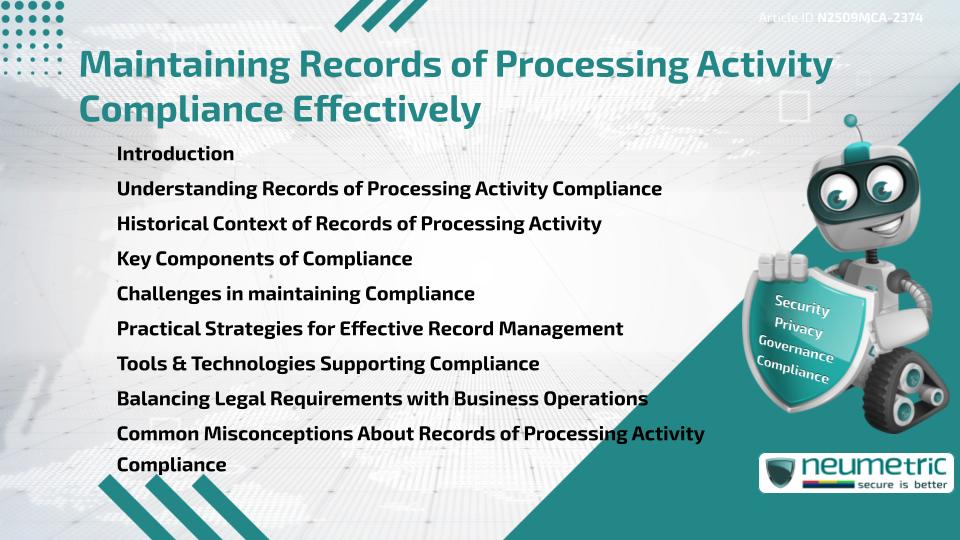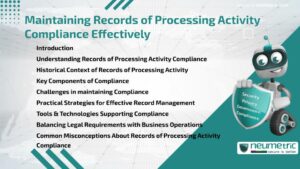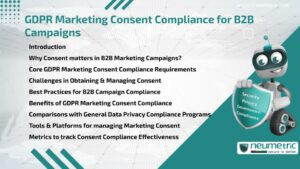Table of Contents
ToggleIntroduction
Maintaining records of processing activity compliance is a critical requirement under Data Protection regulations such as the General Data Protection Regulation [GDPR]. Organisations are legally obligated to document the ways they collect, store & process Personal Data. Effective compliance ensures transparency, accountability & protection against penalties. This article explores what records of processing activity compliance means, why it matters, the challenges Organisations face & the best strategies to manage it effectively.
Understanding Records of Processing Activity Compliance
Records of processing activity compliance refers to the structured documentation of how Personal Data is handled within an Organisation. It includes details such as the purposes of processing, categories of data subjects, data transfers & retention periods. Much like a business inventory log, these records provide a clear map of all Personal Data flows, allowing Organisations & regulators to verify that data is managed responsibly.
Historical Context of Records of Processing Activity
Before modern regulations, Data Management practices varied widely with little uniform oversight. The introduction of the GDPR in 2018 marked a shift towards stringent accountability & transparency requirements. Article 30 of the GDPR specifically requires Organisations to maintain detailed records, highlighting the importance of standardised practices across industries. This historical shift underlines how regulatory frameworks evolved to respond to increasing digital data use.
Key Components of Compliance
Maintaining compliance requires several essential elements:
- Clear documentation of all data processing activities.
- Designation of responsible parties, such as a Data Protection Officer [DPO].
- Integration of data retention Policies.
- Procedures for handling cross-border data transfers.
- Regular reviews & updates to keep records accurate.
These elements ensure that compliance is not only a legal obligation but also a part of effective Risk Management.
Challenges in maintaining Compliance
Organisations often face difficulties such as:
- Keeping records updated when data processing activities change frequently.
- Aligning global operations with different regional requirements.
- Ensuring Employee awareness & consistent implementation.
- Balancing the costs of compliance with other business priorities.
Such challenges can make compliance appear daunting, but they can be managed with structured approaches.
Practical Strategies for Effective Record Management
To maintain records of processing activity compliance effectively, Organisations should:
- Implement centralized record-keeping systems.
- Train staff to recognize the importance of data handling practices.
- Schedule periodic audits to identify gaps.
- Assign clear responsibilities to ensure accountability.
- Use templates aligned with regulatory requirements to reduce errors.
These strategies simplify compliance & ensure that records remain up-to-date & reliable.
Tools & Technologies Supporting Compliance
Modern compliance tools can significantly reduce the burden on Organisations. For instance, compliance management software can automate record updates, generate reports & integrate with data processing systems. Cloud-based solutions further allow for real-time collaboration, especially for businesses operating across multiple jurisdictions. Adopting these technologies provides scalability & accuracy in compliance efforts.
Balancing Legal Requirements with Business Operations
Organisations must strike a balance between meeting legal obligations & maintaining operational efficiency. Overly complex compliance systems can slow down business functions, while insufficient practices increase Risks. A balanced approach involves embedding compliance into daily workflows without adding unnecessary burdens. This perspective ensures both legal safety & practical productivity.
Common Misconceptions About Records of Processing Activity Compliance
Several myths often confuse Organisations:
- Small companies believe they are exempt, but many still fall under Compliance Requirements.
- Some assume compliance is a one-time exercise rather than an ongoing process.
- Others think compliance is purely a legal matter, ignoring its operational & ethical dimensions.
Understanding & dispelling these misconceptions ensures that Organisations remain both compliant & efficient.
Conclusion
Maintaining records of processing activity compliance effectively requires awareness, structured practices & the right tools. By integrating compliance into daily operations, Organisations not only meet legal obligations but also strengthen trust with clients, partners & regulators.
Takeaways
- Records of processing activity compliance is legally required under frameworks like the GDPR.
- Effective compliance involves documentation, accountability & periodic updates.
- Practical strategies include staff training, audits & centralized systems.
- Technology can streamline & simplify compliance.
- Misconceptions can create Risks if not addressed properly.
FAQ
What is records of processing activity compliance?
Records of processing activity compliance refers to documenting how Personal Data is collected, stored & processed in line with regulatory requirements.
Who is responsible for ensuring compliance in an Organisation?
Responsibility often lies with the Data Protection Officer [DPO], though compliance is ultimately a shared responsibility across the Organisation.
Are Small Businesses required to maintain records of processing activity compliance?
Yes, while some exemptions exist, many Small Businesses are still required to maintain records depending on the nature & scope of data processing.
How often should records of processing activity be updated?
Records should be updated whenever data processing practices change & Organisations should also review them periodically, at least annually.
What happens if an organisation fails to maintain compliance?
Non-compliance can result in significant fines, reputational damage & loss of trust from Customers & partners.
Can technology fully automate compliance?
Technology can support & simplify compliance but cannot replace human oversight, judgment & accountability.
What is the difference between compliance documentation & Privacy Policies?
Compliance documentation is internal & detailed, focusing on data flows, while Privacy Policies are external, informing Customers about data use.
Need help for Security, Privacy, Governance & VAPT?
Neumetric provides organisations the necessary help to achieve their Cybersecurity, Compliance, Governance, Privacy, Certifications & Pentesting needs.
Organisations & Businesses, specifically those which provide SaaS & AI Solutions in the Fintech, BFSI & other regulated sectors, usually need a Cybersecurity Partner for meeting & maintaining the ongoing Security & Privacy needs & requirements of their Enterprise Clients & Privacy conscious Customers.
SOC 2, ISO 27001, ISO 42001, NIST, HIPAA, HECVAT, EU GDPR are some of the Frameworks that are served by Fusion – a SaaS, multimodular, multitenant, centralised, automated, Cybersecurity & Compliance Management system.
Neumetric also provides Expert Services for technical security which covers VAPT for Web Applications, APIs, iOS & Android Mobile Apps, Security Testing for AWS & other Cloud Environments & Cloud Infrastructure & other similar scopes.
Reach out to us by Email or filling out the Contact Form…





